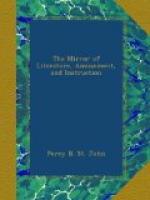WRITTEN ON VIEWING THE PORTRAIT OF CHATTERTON.
Ah! what a contrast in that face portray’d,
Where care and study cast alternate shade;
But view it well, and ask thy heart the
cause,
Then chide, with honest warmth, that cold
applause
Which counteracts the fostering breath
of praise,
And shades with cypress the young poet’s
bays:
Pale and dejected, mark, how genius strives
With poverty, and mark, how well it thrives;
The shabby cov’ring of the gentle
bard,
Regard it well, ’tis worthy thy
regard,
The friendly cobweb, serving for a screen,
The chair, a part of what it once had
been;
The bed, whereon th’ unhappy victim
slept
And oft unseen, in silent anguish, wept,
Or spent in dear delusive dreams, the
night,
To wake, next morning, but to curse the
light,
Too deep distress the artist’s hand
reveals;
But like a friend’s the black’ning
deed conceals;
Thus justice, to mild complacency bends,
And candour, all harsh influence, suspends.
Enthron’d, supreme in judgment,
mercy sits,
And, in one breath condemns, applauds,
acquits:
Whoe’er thou art, that shalt this
face survey,
And turn, with cold disgust, thine eyes
away.
Then bless thyself, that sloth and ignorance
bred
Thee up in safety, and with plenty fed,
Peace to thy mem’ry! may the sable
plume
Of dulness, round thy forehead ever bloom;
May’st thou, nor can I wish a greater
curse;
Live full despis’d, and die without
a nurse;
Or, if same wither’d hag, for sake
of hire,
Should wash thy sheets, and cleanse thee
from the mire,
Let her, when hunger peevishly demands
The dainty morsel from her barb’rous
hands,
Insult, with hellish mirth, thy craving
maw
And snatch it to herself, and call it
law,
Till pinching famine waste thee to the
bone
And break, at last, that solid heart of
stone.
* * * * *
LAY OF THE WANDERING ARAB.
“Away, away, my barb and I,”
As free as wave, as fleet
as wind,
We sweep the sands of Araby,
And leave a world of slaves
behind.
’Tis mine to range in this wild
garb,
Nor e’er feel lonely
though alone;
I would not change my Arab barb,
To mount a drowsy Sultan’s
throne.




